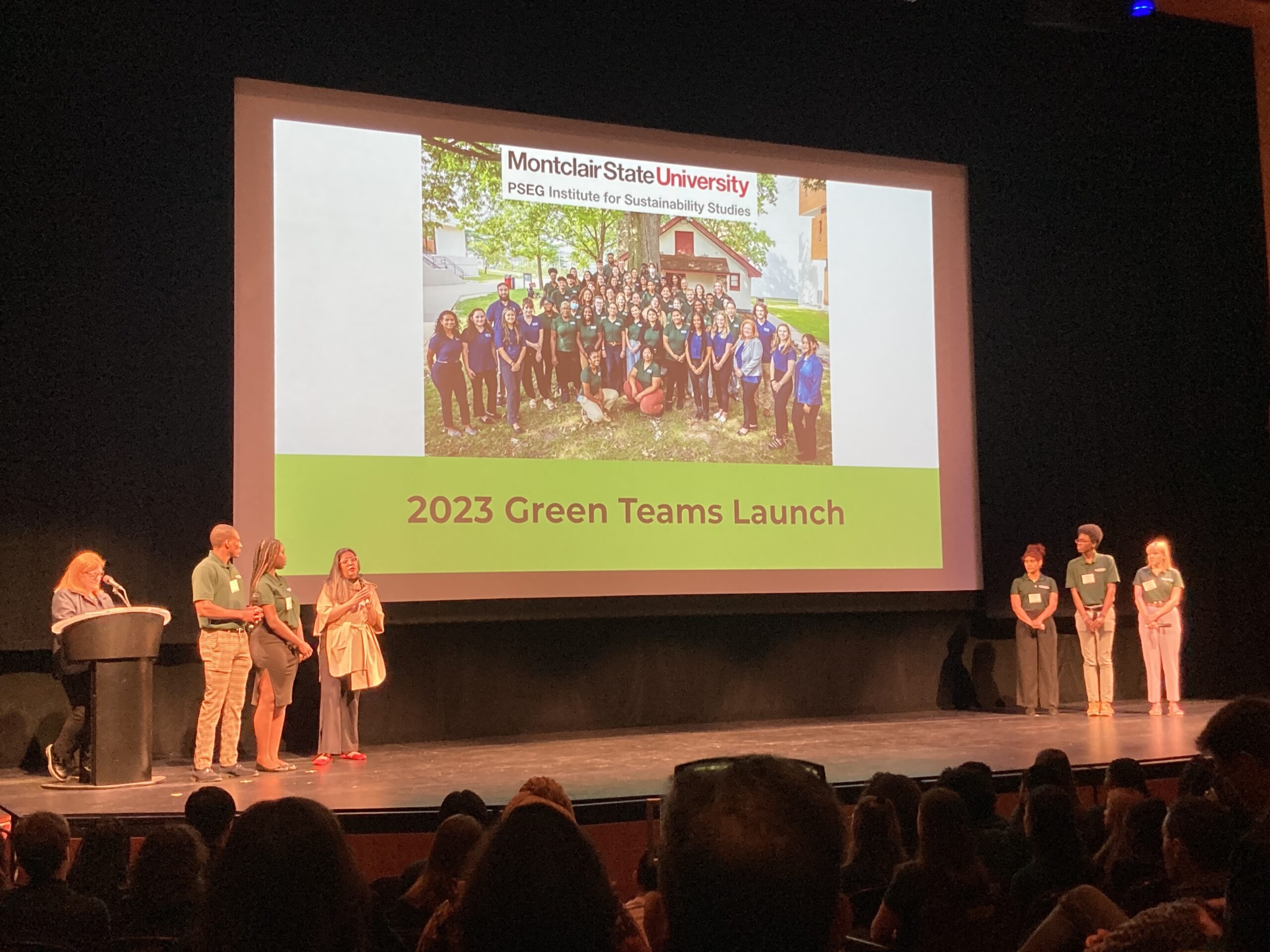

Students from the Green Teams Program of the PSEG Institute for Sustainability Studies take the stage in June.
By Yukthi Sangoi | Student Reporter, Editor-in-Chief, The Vector, New Jersey Institute of Technology
This story was produced in collaboration with CivicStory and the NJ Sustainability Reporting project.
On June 1, students, mentors, and leaders from across the country gathered at Montclair State University’s (MSU) Alexander Kasser Theater to introduce their internship projects for this summer. They are part of The Green Teams Program of the PSEG Institute for Sustainability Studies (ISS). Launched in 2016, this annual initiative groups students with corporations and organizations to address local and global sustainability challenges.
“In the early 2000s, I talked about climate change at a university in South Jersey. We said that if you were a college student at the time and thought you might retire to Florida someday, you might as well stay put because the climate in New Jersey was going to be like Florida in 50 years,” Dr. Amy Tuininga, director of the ISS program, said as the introduction to her opening remarks of the launch event. “The real stars who are fighting climate change are right here with us in this room,” referencing the participants as well as attendees.
This year includes a cohort of 50 students divided into 10 teams; they represent 32 distinct universities and 39 degree programs. Dr. Jonathan Koppell, president of MSU, explained why it’s significant that a university is spearheading this program.
“Public universities aren’t public simply because we get some money from taxpayers, which is true that we do, but it’s because we exist to serve the public interest,” Koppell said. “It wouldn’t make any sense if we as universities said, ‘We exist to serve the public interest,’ and we weren’t doing something to address the state of the planet.”
“To see undergraduate students coming here to help solve complex problems and look at comprehensive issues regarding sustainability magnifies, in my view, what a university experience should be,” Dr. Dawn Soufleris, vice president for Student Development and Campus Life at MSU, commented. “It gives you an opportunity to critically think about how to manage real concerns — real world problems — and solve them. That is exactly the experience that we want students, no matter what they’re studying, to have.”
The launch event featured keynote speaker Katherine Pazakis, chief commercial officer of TerraCycle, whose motto is “Eliminating the Idea of Waste.” It offers solutions such as making items recyclable, cleaning up waste, making items reusable, innovating with waste, and making items from recyclable materials.
“What Dr. Koppell said is true: climate problems are solvable. I think we all have to believe that to be sitting here,” she said, “but solving these problems requires a change because what got us into this situation is certainly not going to be what gets us out.”
Pazakis spoke about how humans invented the idea of waste; she displayed an advertisement from the 1950s that celebrated the idea of being able to throw away metal soft drink packaging instead of returning glass bottles, which were cleaned and reused. People prioritized convenience in this case, and others have prioritized earnings, both leaving the planet’s needs unheeded.
TerraCycle emphasizes making waste elimination a profitable innovation for businesses in order to enforce long-term effective sustainable solutions. It began as a worm food company that composted food waste from dining halls; that was then stored in used plastic bottles and sold as fertilizer. An output that didn’t hold value — food waste — turned into something profitable — fertilizer.
“I’m really excited that the Green Teams initiative exists. I want to echo what each of the other leaders have said: it really comes down to innovation and belief in the ability to create change,” Pazakis concluded. “I think that is what is going to actually transform business today [to] what business needs to be in the future to be sustainable.”
The partnered businesses and organizations this year include PSEG, Memorial Sloan Kettering Cancer Center, Hackensack Meridian Health, New Jersey Resources, Newark Community Food System, dsm-firmenich, NJ Transit — Energy and Sustainability, Port Authority of New York and New Jersey, Stryker, and MSU University Facilities.
Director of Environmental Projects at PSEG Shaun Fine gave final remarks by speaking directly to the students: “We want your voices to be heard; you want your voices to be heard. You are the next level leaders in this ever-growing field.”
This story was produced in collaboration with CivicStory and the NJ Sustainability Reporting project.
